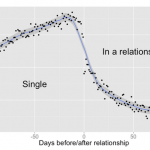Paul Graham, the founder of YCombinator (a start up incubator) has an essay that makes a very appropriate meditation for Lent. In “The Acceleration of Addiction”, he writes:
The world is more addictive than it was 40 years ago. And unless the forms of technological progress that produced these things are subject to different laws than technological progress in general, the world will get more addictive in the next 40 years than it did in the last 40.
The next 40 years will bring us some wonderful things. I don’t mean to imply they’re all to be avoided. Alcohol is a dangerous drug, but I’d rather live in a world with wine than one without. Most people can coexist with alcohol; but you have to be careful. More things we like will mean more things we have to be careful about.
Most people won’t, unfortunately. Which means that as the world becomes more addictive, the two senses in which one can live a normal life will be driven ever further apart. One sense of “normal” is statistically normal: what everyone else does. The other is the sense we mean when we talk about the normal operating range of a piece of machinery: what works best.
These two senses are already quite far apart. Already someone trying to live well would seem eccentrically abstemious in most of the US. That phenomenon is only going to become more pronounced. You can probably take it as a rule of thumb from now on that if people don’t think you’re weird, you’re living badly.
I don’t mean (and I don’t think Graham does either) to draw a distinction between a willfully debauched world and a pure group of isolates taking “the Benedict option.” The problem is that we can all end up feeling like “butter scraped over too much bread” and lost as to the reason why.
I ended up deleting the iPhone game “Threes” from my phone at the beginning of Lent, because I was getting texts like this from friends I had recommended it to:
I just spent 45 minutes playing Threes on my bedroom floor.
At first I was only reaching down to plug my charger back into the wall.
Then I didn’t get back up for 45 minutes.
My experience with the game was similar enough. And the thing that was most noticeable was that there was no countervailing influence from culture. Mentioning losing time to an iphone game prompts friends to try to top the story, or to give me new recommendations, for another game that might capture my attention.
There’s no malice in it, nor even on the part of the game developer (flat fee, no in game adds, so no incentive to keep me playing endlessly). But it’s not good for me, and it’s not a danger I can trust my friends and acquaintances to steer me away from.
For me, the warning sign was how much time the game took without giving me a sense of being trained in something (I can practice spatial reasoning more fruitfully elsewhere). Playing Threes stole my time while leaving me static, but some habits train us to have bad reflexes and should be pruned as well.
In the absence of better norms, I like to audit my attachments to check that they produce a sense of joy, not just a dopamine hit of satisfaction. For me, joy usually has a sense of expansion, not just pleasure, and I want to stay sensitive to those cues, during Lent and at all other times.












